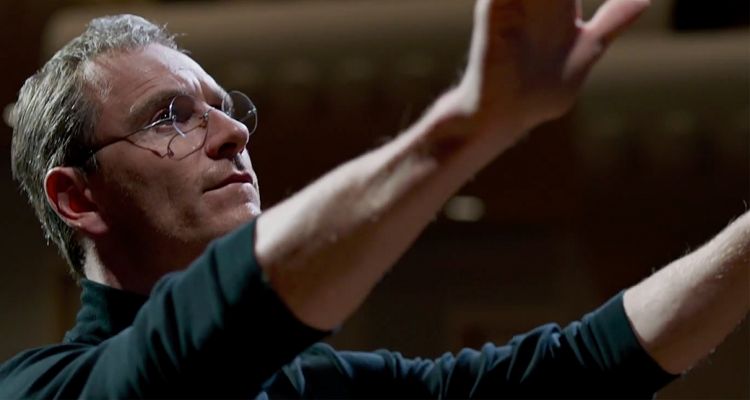 (5 / 5)
(5 / 5)
What is the current fascination with technology entrepreneurs?
From The Social Network to AMC’s Halt and Catch Fire, key figures in the PC movement, real or imagined, have grown to legendary status in the public consciousness. Perhaps it’s because they are ambitious dreamers, mavericks who shape the way we interact with the world — by way of example, this review was drafted on an iPhone and written up on a Macbook — or perhaps because they provide an point of entrance into the digital realm, which is otherwise so hard to dramatize.
In any case, Danny Boyle’s Steve Jobs, the second film in three years to tackle the late Apple magnate’s life and contribution, and by far the better of the two films, reverse engineers the conundrum.
Instead of using him as a way to understand as a means to understand our increasingly technocratic society, Aaron Sorkin ingeniously uses the products Jobs created (or at least dreamed up) as a means to understand the soul of the man himself, as, behind the scenes of three major product launches, Jobs literally and figuratively takes centre stage.
It helps therefore that the man himself, as portrayed by Michael Fassbender, is truly magnetic — appropriate for the German-Irish actor still best known to the world as Magneto. His Jobs is a lanky, loose-limbed mandroid, a cool, collected presence with a modulated voice, but the flash of fervor in his eyes. He’s a fanatic in the cult of himself, so obsessed with making “a dent in the universe”, as he calls it, that he seemingly can’t appreciate the difference between providing computers for the underprivileged and providing for his daughter, Lisa.
Without his customary roguish smile or any elements of costume to hide behind — Jobs’ iconic turtleneck doesn’t appear to the film’s final third — Fassbender is the eye of the storm in the tense moments leading up to the ’84 Mac launch, the NeXT launch in 1988, and the introduction of the iMac in 1998.
Boyle’s direction is less inclined towards his usual stylistic flourishes than keeping Sorkin’s typically verbose screenplay moving through a series of inopportune personal encounters: “It seems like five minutes before every launch, everyone gets drunk and decides to air their grievances.”
While Jobs struts around the corridors as a self-styled visionary, it falls to others to keep the lights on, like soon-to-be-estranged father figure, Apple CEO John Sculley (a heart-rendingly avuncular Jeff Daniels), or simply get the lights working, like long-suffering programmer Andy Hertzfeld (Michael Stuhlbarg). Seth Rogen’s Steve Wozniak, or “Woz”, swings by repeatedly, to beg his old friend and colleague to just acknowledge the work of the Apple II team; failing to realize that he’s pleading with a man for whom empathy is not an easily accessible exe. file.
Steve Jobs skips past its protagonist’s renowned eccentricities — his fruitarian diet or fierce rivalry with Bill Gates — to reveal his tragic, Shakespearean flaw: an utter need for control.
The same fixation that led to Apple adopting a definitively closed operating system, effectively isolating it from the rest of the market, prevents him from sympathizing with his fragile, intemperate ex, Chrisann Brennan (Katherine Waterston), or connecting with the daughter whose paternity he spuriously denies; even while apparently naming a PC after her.
The only person who can occasionally get through to him is his assistant, Joanna Hoffman (Kate Winslet), a stoic Polish Jewish emigre trying to keep her work husband from detonating all his relationships through a patented combination of not-at-all-veiled condescension and savage, presumably Sorkin-augmented wit.
Luckily, Jobs is not the only one with access to the one-liners: when Jobs reminds Andy that he’s had three weeks to fix a system error and that the universe was was created in just one, Andy responds “Well, someday, you’ll have to tell us how you did it.”
As much Sorkin’s film as Boyle’s, if not more, Steve Jobs holds up and takes apart the sealed casing of a man who was loved and hated in equal measure. A man who thought of himself as an artist, who helped democratize technology and wrestle dominance away from IBM, who came back from defeat and built success on failure, but who took sole credit for the work of others and repeatedly wounded the ones he loved.
If Jobs played the orchestra then Steve Jobs plays the man himself and it is a virtuosic performance.
